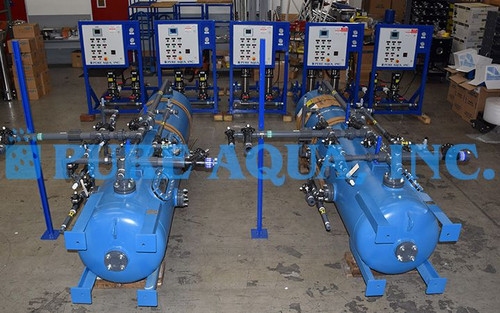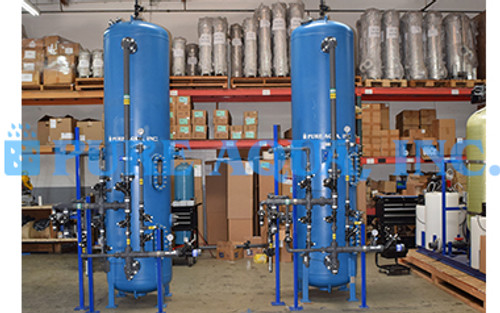Application: School Campus for Laboratory Use for the Chemical Engineering Department (Resistivity reduction used mixed bed DI)
This is model TW-4.5K-340 (From our RO-200 Series) & MB24-PVN/M9065 (From our MBDI Series)
- Automatic operation. Automatic regeneration when water quality falls below pre-set limit or after manual initiation.
- Constant monitoring of water quality
- Solid-state reliability PLC control for trouble-free service
- No untreated by-pass water
- Alternate regeneration water source piping - standard
- Automatic shut down in the event of power failure
- Two-stage air mix standard
- Compact, non-corrosive components
- Steel tanks with rubber lining
- Convenient, modular construction
- Easy, economical installation
- Optional recirculation pumps
- Simultaneous regeneration and chemical displacement
- Brine kill option available for high purity systems
- Programmable purge prior to regeneration
[custom-specifications]
Water Challenges: The challenges of this project was in regards to high resistivity levels in laboratories within a school’s chemical engineering department. Resistivity in water is the frequency of the capacity of water to resist an electrical current, which is directly associated with the quantity of dissolved salts within the water. Applications such as laboratories require ultra pure water, and in order to attain this level of water, the resistivity levels must be decreased to a certain degree.
[/custom-specifications]
[custom-features]
Applied Solution: Two Mixed Bed Deionization Systems to a university in Kuwait—for two different campuses. The diameter of each Mixed Bed DI is 24-in. which includes the mixed bed resin. The purpose of this water is for laboratory use for the chemical engineering department. The capacity of each system is 30-40 GPM. The system includes 5 re-pressurization pumps.
[/custom-features]
[custom-usage]
Our mixed bed DI provides manufacturers with several other advantages such as:
- Scaling and silica reduction
- Improved efficiency of boiler feeds via decreased boiler deposits
- Less need of water used in the course of operations
- Eradication of greater than 99% of suspended solids in the feed water, such as the formation of scale which reduces heat transfer
- Lower alkalinity amongst the boiler feedwater that effects in lower use of amine
- Decreases in the want of make-up water to heat and smooth heat transfer areas and savings in fuel cost
[/custom-usage]
[custom-documents]
[/custom-documents]
-
Efficient!!
It is more efficient than any other deionized water system. We bought 2 just for redundancy purposes.
 ENGLISH
ENGLISH
 ESPAÑOL
ESPAÑOL العربية
العربية PORTUGUÉS
PORTUGUÉS FRANÇAIS
FRANÇAIS















